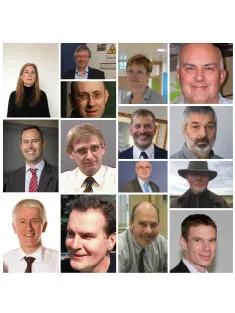Winner: 2020 Industry-Academia Collaboration Award
The DISTINCTIVE Consortium
University of Leeds
For the delivery of research that addressed challenges associated with the continuing safe storage and disposal of radioactive legacy nuclear waste.

The UK Government is committed to nuclear energy having an important role in delivering a secure and affordable energy future. As a low carbon technology, nuclear energy is a critical element of that strategy while helping to meet the UK’s climate change commitments. Public acceptance for this needs the ability to safely manage and dispose of wastes from legacy nuclear operations, and new nuclear build, to be demonstrated, with safe, viable processing routes and personnel with the skills and experience to deliver solutions required. Innovative approaches are also needed to reduce the time and considerable cost to the taxpayer of decommissioning and clean-up activities.
The DISTINCTIVE Consortium contributed to these strategic goals in a positive way through the roll-out of innovative technical solutions and training of the next generation of scientists and engineers with the skills and expertise required to tackle nuclear waste management and decommissioning issues.
Biography
The DISTINCTIVE (Decommissioning, Immobilisation and Storage Solutions for Nuclear Waste Inventories) Consortium, funded by the EPSRC and industry, was a strategic partnership between 11 leading universities (Birmingham, Bristol, Imperial College London, Lancaster, Leeds, Loughborough, Manchester, Sheffield, Strathclyde, Surrey and University College London) and three industry partners (National Nuclear Laboratory, Nuclear Decommissioning Authority, Sellafield Ltd) in the area of nuclear decommissioning and waste management, formed to support UK government strategy.
The multi-disciplinary team included renowned experts in materials chemistry, radiochemistry, geochemistry, computational chemistry, chemical engineering and ceramic science, and addressed challenges associated with the continuing safe storage and disposal of radioactive legacy nuclear waste, and the roll-out of novel techniques and impactful research findings on nuclear sites and operational practices. Led by Professor Michael Fairweather (PI, Leeds) and supported by Dr Lois Tovey (consortium manager, Leeds), 46 academics, 17 post-doctoral researchers, 42 PhD students and 60 industrial personnel were directly involved in the research. In addition, the consortium took advice and guidance from an International Advisory Group that included 13 industry and six US stakeholders.
As a result of the success of DISTINCTIVE, a follow-on project (TRANSCEND – Transformative Science and Engineering for Nuclear Decommissioning) was awarded. This project, again funded by the EPSRC and industry, is led by the University of Leeds and involves 11 world-leading universities. Most importantly, given the significant impact of DISTINCTIVE, the involvement of industry partners has been increased from three to eight. As with DISTINCTIVE, overall and individual project scopes were again developed collaboratively between academic and industry partners, which bodes well for the ongoing delivery of impactful research and of trained personnel into the industry.
Ideas and critical thinking are developed from multiple perspectives, allowing greater creativity and the synthesis of novel, synergistic and effective solutions that are beyond the capability of a single discipline.
The DISTINCTIVE Consortium
Q&A with The DISTINCTIVE Consortium
Why do you think teamwork is important in science?
The complexities of nuclear decommissioning and waste management make teamwork and collaboration essential. Teams of researchers working together and smartly deliver enormous benefits to any area of research, increasing ideas and creativity through diverse perspectives, improving productivity and promoting risk in research, with its potential to deliver ground-breaking outcomes. It also significantly assists the development of individuals within the team, improving and broadening their skills.
Why do you think interdisciplinary research and collaboration is important in science?
Complex scientific and engineering problems of practical relevance, as addressed by the DISTINCTIVE consortium, demand an interdisciplinary and collaborative approach. All real-world challenges require study by different disciplines through which researchers are able to make connections across discipline boundaries, allowing knowledge and advances in one field of study to be applied in another. Ideas and critical thinking are developed from multiple perspectives, allowing greater creativity and the synthesis of novel, synergistic and effective solutions that are beyond the capability of a single discipline. International perspectives and collaboration are also essential in ensuring the widest possible engagement in the development of research strategies and solutions.